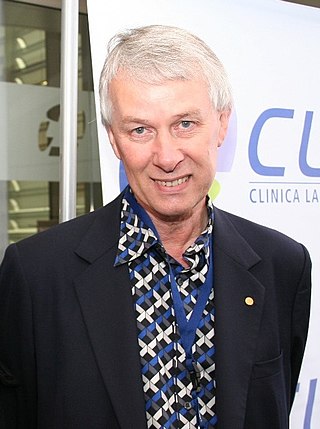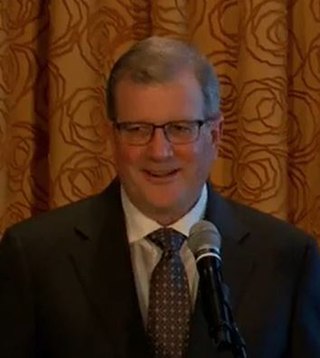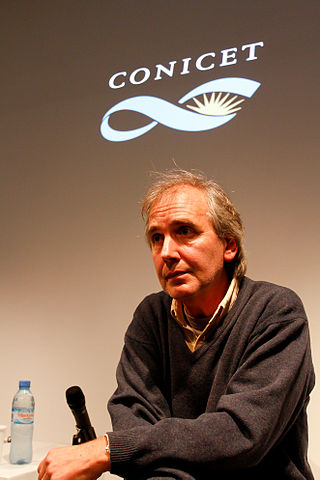
James Dewey Watson is an American molecular biologist, geneticist, and zoologist. In 1953, he co-authored with Francis Crick the academic paper proposing the double helix structure of the DNA molecule. Watson, Crick and Maurice Wilkins were awarded the 1962 Nobel Prize in Physiology or Medicine "for their discoveries concerning the molecular structure of nucleic acids and its significance for information transfer in living material".

Walter Gilbert is an American biochemist, physicist, molecular biology pioneer, and Nobel laureate.

David Baltimore is an American biologist, university administrator, and 1975 Nobel laureate in Physiology or Medicine. He is a professor of biology at the California Institute of Technology (Caltech), where he served as president from 1997 to 2006. He founded the Whitehead Institute and directed it from 1982 to 1990. In 2008, he served as president of the American Association for the Advancement of Science.

Sydney Brenner was a South African biologist. In 2002, he shared the Nobel Prize in Physiology or Medicine with H. Robert Horvitz and Sir John E. Sulston. Brenner made significant contributions to work on the genetic code, and other areas of molecular biology while working in the Medical Research Council (MRC) Laboratory of Molecular Biology in Cambridge, England. He established the roundworm Caenorhabditis elegans as a model organism for the investigation of developmental biology, and founded the Molecular Sciences Institute in Berkeley, California, United States.

Cold Spring Harbor Laboratory (CSHL) is a private, non-profit institution with research programs focusing on cancer, neuroscience, plant biology, genomics, and quantitative biology. It is located in Laurel Hollow on Long Island, New York.

The Nirenberg and Matthaei experiment was a scientific experiment performed in May 1961 by Marshall W. Nirenberg and his post-doctoral fellow, J. Heinrich Matthaei, at the National Institutes of Health (NIH). The experiment deciphered the first of the 64 triplet codons in the genetic code by using nucleic acid homopolymers to translate specific amino acids.

Phillip Allen Sharp is an American geneticist and molecular biologist who co-discovered RNA splicing. He shared the 1993 Nobel Prize in Physiology or Medicine with Richard J. Roberts for "the discovery that genes in eukaryotes are not contiguous strings but contain introns, and that the splicing of messenger RNA to delete those introns can occur in different ways, yielding different proteins from the same DNA sequence". He has been selected to receive the 2015 Othmer Gold Medal.

Sir Richard John Roberts is a British biochemist and molecular biologist. He was awarded the 1993 Nobel Prize in Physiology or Medicine with Phillip Allen Sharp for the discovery of introns in eukaryotic DNA and the mechanism of gene-splicing. He currently works at New England Biolabs.
Tom Maniatis, is an American professor of molecular and cellular biology. He is a professor at Columbia University, and serves as the Scientific Director and CEO of the New York Genome Center.

Joan Elaine Argetsinger Steitz is Sterling Professor of Molecular Biophysics and Biochemistry at Yale University and Investigator at the Howard Hughes Medical Institute. She is known for her discoveries involving RNA, including ground-breaking insights into how ribosomes interact with messenger RNA by complementary base pairing and that introns are spliced by small nuclear ribonucleic proteins (snRNPs), which occur in eukaryotes. In September 2018, Steitz won the Lasker-Koshland Award for Special Achievement in Medical Science. The Lasker award is often referred to as the 'American Nobel' because 87 of the former recipients have gone on to win Nobel prizes.

David L. Spector is a cell and molecular biologist best recognized for his research on gene expression and nuclear dynamics. He is currently a Professor at Cold Spring Harbor Laboratory (CSHL). From 2007 to 2023, he served as Director of Research of CSHL.
The Breakthrough Prize in Life Sciences is a scientific award, funded by internet entrepreneurs Mark Zuckerberg and Priscilla Chan of Facebook; Sergey Brin of Google; entrepreneur and venture capitalist Yuri Milner; and Anne Wojcicki, one of the founders of the genetics company 23andMe.
Louise Tsi Chow is a professor of biochemistry and molecular genetics at the University of Alabama at Birmingham and a foreign associate with the National Academy of Sciences, known for her research on the human papillomavirus. Her research contributed to the discovery of gene splicing, and in 1993, her collaborator, Richard J. Roberts, received the Nobel Prize for the research, leading some to assert that Chow should have received the honor as well.

Don W. Cleveland is an American cancer biologist and neurobiologist.

The Gene: An Intimate History is a book written by Siddhartha Mukherjee, an Indian-born American physician and oncologist. It was published on 17 May 2016 by Scribner. The book chronicles the history of the gene and genetic research, all the way from Aristotle to Crick, Watson and Franklin and then the 21st century scientists who mapped the human genome. The book discusses the power of genetics in determining people's well-being and traits. It delves into the personal genetic history of Siddhartha Mukherjee's family, including mental illness. However, it is also a cautionary message toward not letting genetic predispositions define a person or their fate, a mentality that the author says led to the rise of eugenics in history.
Gregory James Hannon is a professor of molecular cancer biology and director of the Cancer Research UK Cambridge Institute at the University of Cambridge. He is a Fellow of Trinity College, Cambridge while also serving as a director of cancer genomics at the New York Genome Center and an adjunct professor at Cold Spring Harbor Laboratory.

C. Frank Bennett is an American pharmacologist. Bennett is currently the Senior Vice President of Research and Neurology Franchise Leader at Ionis Pharmaceuticals. He is a 2019 Breakthrough Prize winner in Life Sciences, which he shared with his collaborator Adrian R. Krainer for the development of an effective antisense oligonucleotide therapy for children with the neurodegenerative disease spinal muscular atrophy.

Nikolaus Rajewsky is a German system biologist at the Max-Delbrück-Center for Molecular Medicine (MDC) and at the Charité in Berlin. He founded and directs the “Berlin Institute for Medical Systems Biology”. He leads the Rajewsky lab, where he studies how RNA regulates gene expression. He also co-chairs LifeTime, a pan-European research initiative of more than 90 academic institutions and 70 companies, which aims to revolutionize healthcare by mapping, understanding, and targeting cells during disease progression. LifeTime integrates several technologies: single-cell multiomics, machine learning, and personalized disease models such as organoids. Rajewsky has received numerous awards and honors, including the most prestigious German award, the Gottfried Wilhelm Leibniz Prize, endowed with 2.5 million euros by the German Research Foundation (DFG).

Alberto Kornblihtt is an Argentine molecular biologist who specializes in alternative ribonucleic acid splicing. During his postdoctoral training with Francisco Baralle in Oxford, Kornblihtt documented one of the first cases of alternative splicing, explaining how a single transcribed gene can generate multiple protein variants. Kornblihtt was elected as a foreign associate of the National Academy of Sciences of the United States in 2011, received the Diamond Award for the most relevant scientist of Argentina of the decade, alongside physicist Juan Martin Maldacena, in 2013, and was incorporated to the Académie des Sciences of France in 2022.
Ravindra N. Singh is an Indian American scientist, inventor and academic. He is a professor in the Department of Biomedical Sciences of the College of Veterinary Medicine at Iowa State University.















